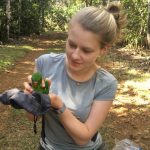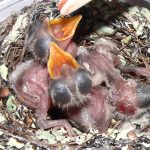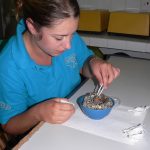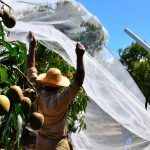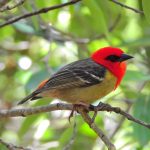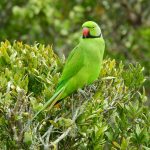Partners and collaborators
BIRD BREEDING AND MONITORING
The Indian ocean’s volcanic Mascarene islands are thriving with human communities and vibrant wildlife, some of which are entirely unique to the Mascarenes.
However, an increase in human activity over the years has brought complex challenges to the island’s wildlife, as the rich biodiversity becomes increasingly threatened by a human dominated landscape. Since 2000, we’ve been working on the islands of Mauritius and Rodrigues alongside our partner, the Mauritian Wildlife Foundation (MWF), monitoring wildlife and running projects in local communities, with the aim of better understanding the issues facing the island’s wildlife, and how we can best tackle them.
MWF have spent decades restoring the islet of Ile aux Aigrettes, which is all that remains of Mauritius’ historic dry coastal forests, with acres of habitat on the Mauritian mainland lost to centuries of deforestation and the spread of invasive species. We support the work of MWF financially, and also share our extensive expertise in bird breeding and monitoring, to join their mission to prevent extinction in the Mascarenes. As a result of this collaborative work, we’ve collectively been able to create a haven for endangered passerines (songbirds), the echo parakeet, the pink pigeon, and numerous endemic reptile species.
As an ancient ecosystem, Ile aux Aigrettes is a window for the rest of Mauritius to see what wildlife could look like, if it’s properly protected. Thousands of school children and tourists visit the island each year, connecting with MWF’s rich ‘Learning with Nature’ education and community engagement programme – 10 years of MWF development supported by Chester Zoo’s education and social science experts. This tried and tested community approach, is to spread beyond Ile aux Aigrettes, across Mauritius itself.
One of the first target areas in Mauritius, is the Black River Gorges National Park, home to the echo parakeet, which is only one of seven endemic Mauritian parakeets to survive the pressures of hunting and habitat loss. Disease also threatened their declining populations, with an outbreak of the highly infectious Psittacine Beak and Feather Disease in 2005 resulting in the intensive species’ management work, to halt. Despite this, the wild population continued to be managed and monitored, with results from our collaborative work leading to a remarkable recovery.
In 2007 the echo parakeet was officially down listed from Critically Endangered, to Endangered, by the International Union for Conservation of Nature (IUCN). Research and monitoring across all populations continues with a focus on disease monitoring; these wild populations are still managed but at a less intensive level than in previous years.
We’re working with the University of Kent’s DICE division (Durrell Institute of Conservation and Ecology), answering the scientific questions to support MWF’s work on the ground. This work helps define the best methods for parakeet monitoring, and understanding the genetic status of existing populations. Meanwhile, our pioneering Conservation Scholars are answering questions about the effectiveness of supplementary feeding programmes, and ways to reduce the spread of beak and feather disease virus (BFDV) among parakeet groups.
‘ONE PLAN’ CONSERVATION APPROACH
On the island of Rodrigues, at Grand Montagne Nature Reserve, we are connecting visitors with a landscape that after 12 years of careful restoration, is a prime example of the island’s once common upland forest ecosystem.
Alongside our conservation work with endangered bird species, our ‘one-plan’ conservation strategy is supporting the fruit bats on both Mauritius and Rodrigues, animals which are seen as pests due to their noisy behaviour and consumption of common Mauritian food crops. Working with MWF and the IUCN Human-Wildlife Conflict Task Force, we’ve been growing our understanding of fruit bat ecology on the islands, quantifying the bats damage to crops, and bringing stakeholders across the nation together in the hope that non-lethal answers to the conflict, can be found, replacing the existing ‘cull’ strategy.
Community work and wildlife monitoring has seen success in the last 15 years, with both the Mauritius fruit bat and Echo parakeet downgraded from critically endangered to endangered – hope is very much alive that Mauritian endemics and people, can coexist sustainably for decades to come.





